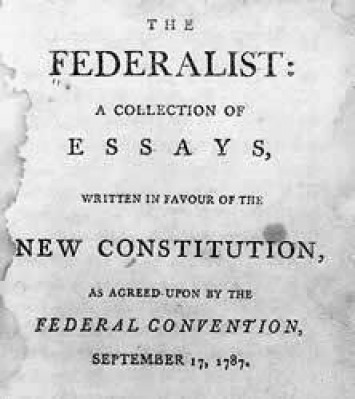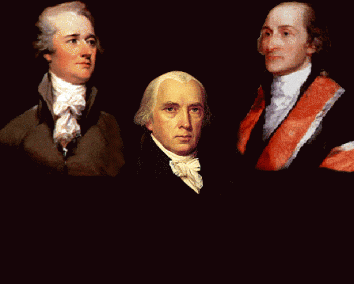The Federalist Papers
The Federalist Papers, written by Alexander Hamilton (wrote 51 articles), James Madison (wrote 29 articles), and John Jay (wrote 5 articles), are a series of 85 essays in favor of the ratification of the Constitution. The three authors worked under the pseudonym of Publius. Many controversial areas of debate for ratification are discussed in the Federalist Papers such as:
There is no need for a Bill of Rights (No. 84)
The Federalist Papers strictly opposed the Bill of Rights. Hamilton argued that by adding a list of liberties Americans had a right to have, it would become known as the list of the only liberties Americans could have.
There should be a single President (No. 70)
In this paper, Publius argued:
(No. 51)
Madison argues here that:
The Federalist Papers strictly opposed the Bill of Rights. Hamilton argued that by adding a list of liberties Americans had a right to have, it would become known as the list of the only liberties Americans could have.
There should be a single President (No. 70)
In this paper, Publius argued:
- After Anti-Federalists suggested several alternatives to the single leader Executive Branch, the papers argued that there should be a single president of the United States of America.
- That two or more people given an equal amount of authority were bound to differ in their opinions at some point in time, causing problems in running a government.
(No. 51)
Madison argues here that:
- The system of checks and balances prevents inordinate growth of power in any of the three branches of government.
- There is no way power can be divided absolutely equally between the three branches, as the legislative branch was created to be more powerful, but separating powers stops one certain branch from having authority over two other inferior branches.
The Utility of the Union as a Safeguard against Domestic Faction and Insurrection(No. 10)
In what is perhaps the famous federalist paper, Madison discusses the issue of faction. Faction, defined by Madison himself, is "a number of citizens, whether amounting to a minority or majority of the whole, who are united and actuated by some common impulse of passion, or of interest, adverse to the rights of other citizens, or to the permanent and aggregate interests of the community."
Madison argues that the only way to eliminate faction is to eliminate liberty, saying, "Liberty is to faction what air is to fire, an aliment without which it instantly expires".
Madison concludes his argument by stating that:
In what is perhaps the famous federalist paper, Madison discusses the issue of faction. Faction, defined by Madison himself, is "a number of citizens, whether amounting to a minority or majority of the whole, who are united and actuated by some common impulse of passion, or of interest, adverse to the rights of other citizens, or to the permanent and aggregate interests of the community."
Madison argues that the only way to eliminate faction is to eliminate liberty, saying, "Liberty is to faction what air is to fire, an aliment without which it instantly expires".
Madison concludes his argument by stating that:
- Liberty is essential to political life,
- Liberty cannot be abolished,
- Faction can be controllable in government,
- It is the violence caused by faction that must be avoided, but not violent faction can be healthy to a government.


